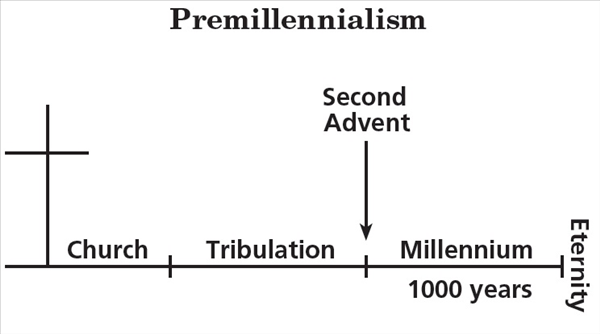What Does Premillennialism Mean?
Premillennialism is one of the three major views of Bible prophecy (the others are amillennialism and postmillennialism). Premillennialism teaches that the second coming of Jesus Christ to the earth (known also as the second advent), will occur before the establishment of the thousand-year reign of Jesus Christ from Jerusalem described in Revelation 20:1–7. This reign is known as the millennium.
The English theological term premillennialism comes from the Latin elements pre (before), mille (thousand), and annus (year). Premillennialism means that Jesus Christ will return to the earth “before the thousand years.”
There are hundreds of millennium references in the Old Testament that speak of the time of Israel’s end-time restoration to the land in blessing. However, it is not until John receives his revelation on the island of Patmos at the end of the New Testament era that the length of the Messiah’s earthly reign is specified.
In the early church, premillennialism was called chiliasm (from the Greek term chilioi meaning “one thousand” used six times in Revelation 20:2–7). Theologian Dr. Charles Ryrie cites essential features of premillennial view of Christ’s reign as follows: “Its duration will be 1,000 years; its location will be on this earth; its government will be theocratic with the personal presence of Christ reigning as King; and it will fulfill all the yet-unfulfilled promises about the earthly kingdom.”12
What Is Dispensational Premillennialism?
Dispensational premillennialism (the majority premillennial view) holds that there will be a future, literal thousand-year reign of Jesus Christ upon the earth following the events of the rapture, tribulation, and second coming.
Dispensational premillennialists hold that Israel and the church are two separate and distinct entities throughout all of history, including the millennium. Covenant premillennialists hold that in the Old and New Testament eras, Israel and the church were the same, but in the millennium they will be separate.
There are several forms of premillennialism that differ as to how the rapture relates to the tribulation but all teach that the millennium is one thousand literal years and follows Christ’s second advent.
Origins of Premillennialism
Premillennialism, or chiliasm as it was known in the early church, was the earliest of the three millennial systems to arise. Church historian Philip Schaff explains:
The most striking point in the eschatology of the ante-Nicene Age is the prominent chiliasm or millenarianism, that is the belief of a visible reign of Christ in glory on earth with the risen saints for a thousand years, before the general resurrection and judgment. It was indeed not the doctrine of the church embodied in any creed or form of devotion, but a widely current opinion of distinguished teachers.13
Premillennialism fell out of favor during the Middle Ages but was revived by the Puritans in the seventeenth century. It is the viewpoint of a majority of those who are conservative in their approach to biblical interpretation.
Premillennialism is contrasted with the postmillennial teaching that Christ will return after reigning spiritually through the church from His throne in heaven for a long period of time during the current age. Premillennialism is also contrasted with the amillennial view that also advocates a present, but pessimistic, spiritual reign of Christ. Biblical premillennialism is a necessary foundation for pretribulationism since it is impossible for either postmillennialism or amillennialism to support pretribulationism.

Premillennialism is simply the result of interpreting the whole Bible, Genesis to Revelation, in the most natural and normative way—literally. Many of the critics of premillennialism admit that if the literal approach is applied consistently to the whole of Scripture, then premillennialism is the natural result. If the Old Testament promises are ever going to be fulfilled literally for Israel as a nation, then they are yet in the future. This is also supportive of premillennialism. Premillennialism also provides a satisfactory and victorious end to history in time as humanity through Christ satisfactorily fulfills the creation mandate to rule over the world.
Copyright 2011 Timothy J. Demy and Thomas Ice
Used by permission. All rights reserved.
Kregel Publications
P.O. Box 2607
Grand Rapids, MI 49501
Photo credit: ©GettyImages
This article is part of our larger End Times Resource Library. Learn more about the rapture, the anti-christ, bible prophecy and the tribulation with articles that explain Biblical truths. You do not need to fear or worry about the future!
Battle of Armageddon
Tribulation
Signs of the End Times
The Four Horsemen of the Apocalypse
The Seventh Seal Opened
What Is the Death Angel?








